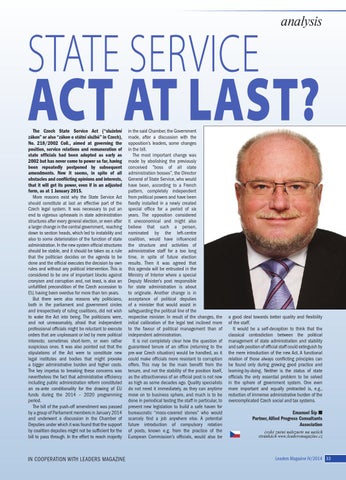STATE SERVICE
analysis
ACT AT LAST? The Czech State Service Act (“služební zákon” or also “zákon o státní službě” in Czech), No. 218/2002 Coll., aimed at governing the position, service relations and remuneration of state officials had been adopted as early as 2002 but has never come to power so far, having been repeatedly postponed by subsequent amendments. Now it seems, in spite of all obstacles and conflicting opinions and interests, that it will get its power, even if in an adjusted form, as at 1 January 2015. More reasons exist why the State Service Act should constitute at last an effective part of the Czech legal system. It was necessary to put an end to vigorous upheavals in state administration structures after every general election, or even after a larger change in the central government, reaching down to section heads, which led to instability and also to some deterioration of the function of state administration. In the new system official structures should be stable, and it should be taken as a rule that the politician decides on the agenda to be done and the official executes the decision by own rules and without any political intervention. This is considered to be one of important blocks against cronyism and corruption and, not least, is also an unfulfilled precondition of the Czech accession to EU, having been overdue for more than ten years. But there were also reasons why politicians, both in the parliament and government circles and irrespectively of ruling coalitions, did not wish to wake the Act into being. The politicians were, and not unreasonably, afraid that independent professional officials might be reluctant to execute orders that are unpleasant or led by mere political interests; sometimes short-term, or even rather suspicious ones. It was also pointed out that the stipulations of the Act were to constitute new legal institutes and bodies that might provoke a bigger administrative burden and higher costs. The key impetus to breaking these concerns was nevertheless the fact that administrative efficiency including public administration reform constituted an ex-ante conditionality for the drawing of EU funds during the 2014 – 2020 programming period. The bill of the push-off amendment was passed by a group of Parliament members in January 2014 and underwent a discussion in the Chamber of Deputies under which it was found that the support by coalition deputies might not be sufficient for the bill to pass through. In the effort to reach majority
IN COOPERATION WITH LEADERS MAGAZINE
in the said Chamber, the Government made, after a discussion with the opposition’s leaders, some changes in the bill. The most important change was made by abolishing the previously conceived ”boss of all state administration bosses”, the Director General of State Service, who would have been, according to a French pattern, completely independent from political powers and have been fixedly installed in a newly created special office for a period of six years. The opposition considered it uneconomical and might also believe that such a person, nominated by the left-centre coalition, would have influenced the structure and activities of administrative staff for a too long time, in spite of future election results. Then it was agreed that this agenda will be entrusted in the Ministry of Interior where a special Deputy Minister’s post responsible for state administration is about to originate. Another change is in acceptance of political deputies of a minister that would assist in safeguarding the political line of the respective minister. In result of the changes, the initial calibration of the legal text inclined more to the favour of political management than of independent administration. It is not completely clear how the question of guaranteed tenure of an office (returning to the pre-war Czech situation) would be handled, as it could make officials more resistant to corruption offers. This may be the main benefit from the tenure, and not the stability of the position itself, as the attractiveness of an official post is not now as high as some decades ago. Quality specialists do not need it immediately, as they can anytime move on to business sphere, and much is to be done in periodical testing the staff in particular, to prevent new legislation to build a safe haven for bureaucratic “moss-covered stones” who would scarcely find a job anywhere else. A potential future introduction of compulsory rotation of posts, known e.g. from the practice of the European Commission’s officials, would also be
a good deal towards better quality and flexibility of the staff. It would be a self-deception to think that the classical contradiction between the political management of state administration and stability and safe position of official staff could extinguish by the mere introduction of the new Act. A functional relation of those always conflicting principles can be found only during growing good practice and learning-by-doing. Neither is the status of state officials the only essential problem to be solved in the sphere of government system. One even more important and equally protracted is, e.g., reduction of immense administrative burden of the overcomplicated Czech social and tax systems. Emanuel Šíp ■ Partner, Allied Progress Consultants Association české znění naleznete na našich stránkách www.leadersmagazine.cz
Leaders Magazine IV/2014 33
